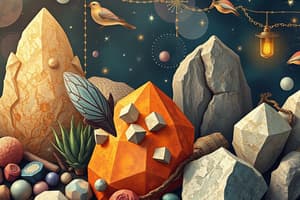Podcast
Questions and Answers
Which property describes how easily a mineral splits along a flat surface?
Which property describes how easily a mineral splits along a flat surface?
- Luster
- Fracture
- Cleavage (correct)
- Density
What is the process called when minerals form a crystal structure by rearranging atoms?
What is the process called when minerals form a crystal structure by rearranging atoms?
- Crystallization (correct)
- Deposition
- Erosion
- Compaction
Which of the following types of rocks is formed from particles of sand, shells, or remains of plants and animals?
Which of the following types of rocks is formed from particles of sand, shells, or remains of plants and animals?
- Igneous
- Metamorphic
- Granular
- Sedimentary (correct)
What does the Mohs Scale of Hardness measure?
What does the Mohs Scale of Hardness measure?
Which process involves the movement of weathered rock by natural forces such as water or wind?
Which process involves the movement of weathered rock by natural forces such as water or wind?
What distinguishes clastic sedimentary rocks from other types of sedimentary rocks?
What distinguishes clastic sedimentary rocks from other types of sedimentary rocks?
Which type of igneous rock is formed through the cooling of lava on Earth's surface?
Which type of igneous rock is formed through the cooling of lava on Earth's surface?
How are folated metamorphic rocks characterized?
How are folated metamorphic rocks characterized?
What process is responsible for the transformation of igneous or sedimentary rocks into metamorphic rocks?
What process is responsible for the transformation of igneous or sedimentary rocks into metamorphic rocks?
Which process involves the settling of weathered and eroded materials in layers?
Which process involves the settling of weathered and eroded materials in layers?
What are chemical sedimentary rocks primarily formed from?
What are chemical sedimentary rocks primarily formed from?
Which of the following processes describes how igneous rocks can become magma?
Which of the following processes describes how igneous rocks can become magma?
Which type of rock is formed from the compression and cementation of sediments?
Which type of rock is formed from the compression and cementation of sediments?
Flashcards
What is a mineral?
What is a mineral?
A naturally occurring, solid, inorganic substance with a crystal structure.
What is crystallization?
What is crystallization?
The process of forming a crystal structure by rearranging atoms.
What is erosion?
What is erosion?
The process of breaking down rocks by wind, water, ice, or gravity.
What is deposition?
What is deposition?
Signup and view all the flashcards
What are sedimentary rocks?
What are sedimentary rocks?
Signup and view all the flashcards
What are igneous rocks?
What are igneous rocks?
Signup and view all the flashcards
What are intrusive igneous rocks?
What are intrusive igneous rocks?
Signup and view all the flashcards
What are extrusive igneous rocks?
What are extrusive igneous rocks?
Signup and view all the flashcards
What are clastic sedimentary rocks?
What are clastic sedimentary rocks?
Signup and view all the flashcards
What are organic sedimentary rocks?
What are organic sedimentary rocks?
Signup and view all the flashcards
What are chemical sedimentary rocks?
What are chemical sedimentary rocks?
Signup and view all the flashcards
What are metamorphic rocks?
What are metamorphic rocks?
Signup and view all the flashcards
What are foliated metamorphic rocks?
What are foliated metamorphic rocks?
Signup and view all the flashcards
Study Notes
Minerals and Rocks
- Minerals are naturally occurring, solid, inorganic substances with a specific crystal structure
- Minerals are identified by their color, luster (how they reflect light), density, hardness (using the Mohs scale), cleavage (how easily they split), and fracture (how they break)
- Crystallization is the process of forming a crystal structure by rearranging atoms
- Minerals form from magma and lava
- Rocks are made of minerals
- Rocks are identified by their mineral composition (how many different minerals they have) and texture (the look and feel of the rock based on the size, shape, and pattern of the grains)
- Grain refers to the particles of minerals or other rocks in a rock.
Types of Rocks
- There are three main types of rocks: sedimentary, metamorphic, and igneous
- Sedimentary rocks are formed from particles of sand, shells, plant remains, or animal remains (sediment) that are layered and buried beneath Earth's surface. These layers are compacted and cemented together.
- Sedimentary rocks form through the processes of erosion (moving weathered rock), deposition (sediment is dropped in new locations), compaction (sediments being pressed together under their own weight), and cementation.
- Igneous rocks form from magma or lava
- Metamorphic rocks form when heat, pressure, or chemical reactions change existing rocks.
Studying That Suits You
Use AI to generate personalized quizzes and flashcards to suit your learning preferences.




